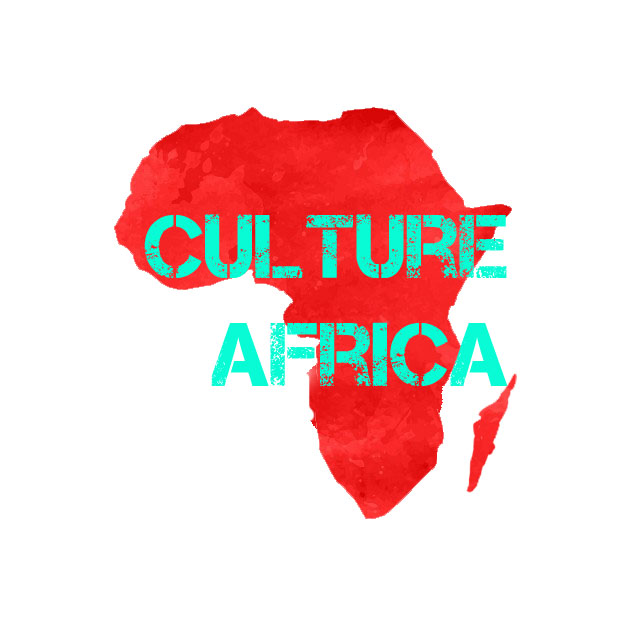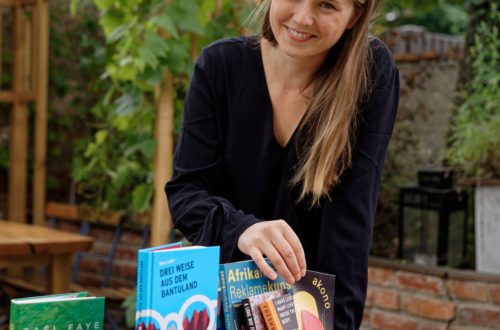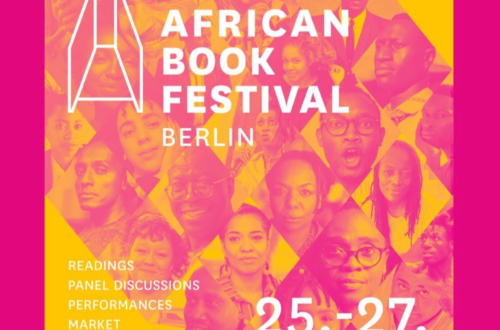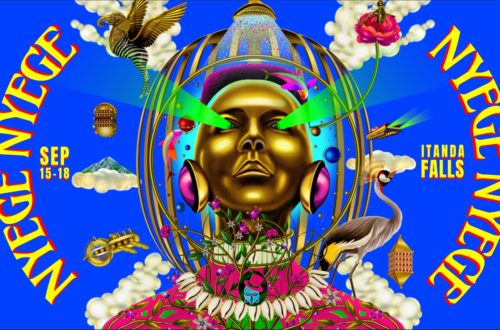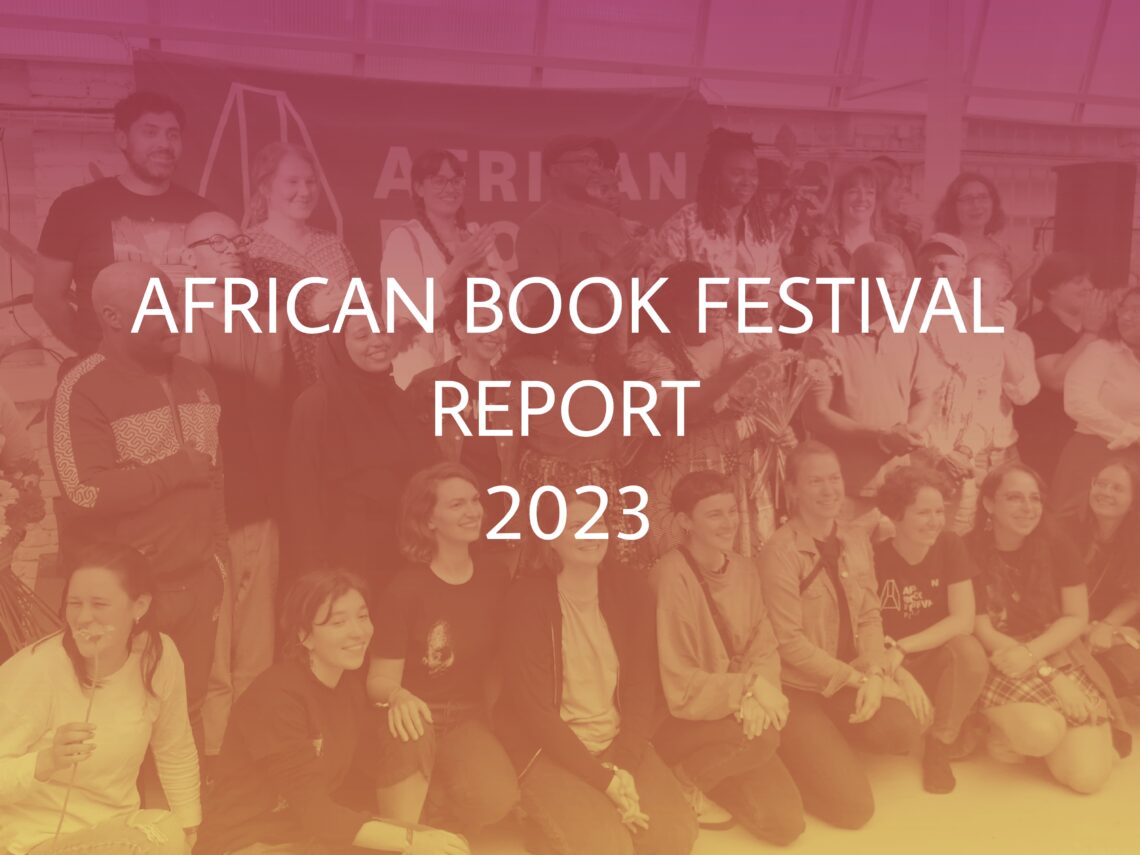
African Book Festival in Berlin – Three Days of Literature and Pleasure – deutsch-english
African Book Festival in Berlin – Three Days of Literature and Pleasure: Die fünfte Ausgabe des African Book Festival in Berlin ist zu Ende und schon bald nach dessen Ende fehlt einem was. Warum ist das so und was macht dieses Literaturevent so speziell? Diesen Fragen möchte ich im persönlichen Report des diesjaehrigen ABF nachgehen.
FOR ENGLISH VERSION PLEASE SCROLL DOWN
Ich kann mich noch gut an letztes Jahr erinnern, an ein Gespraech mit Jona Krützfeld vom akono Verlag, die ja selbst Verlegerin afrikanischer Literatur ist. Wir haben über die Notwendigkeit eines solchen Festivals in Deutschland diskutiert. Warum also braucht es dieses Festival, dass nun seine fünfte Auflage erlebte? Die Antworten waren unterschiedlich. Ich habe diese Frage im Laufe des letzten Jahres auch anderen aus dem Kulturbetrieb gestellt. Aber dies ist immer eine theoretische Diskussion. Die besten Antwort darauf gibt das African Book Festival selbst. Denn wenn das ABF eine besondere Klasse hat, dann die, dass es hier alles andere als nur theoretisch und akademisch zugeht. Literatur zum Anfassen sozusagen. Vom manchmal all zu hohen Ross des akademischen Dozierens auf den elitären Literaturfestivals, zur unterhaltsamen Veranstaltung für Literaturliebhaber:innen. Die erneut vielen Besucher:innen des ABF , darunter überwiegend junge Menschen, geben einem die Hoffnung, dass afrikanische Literatur sehr lebendig sein kann. Wer sich drei Tage auf dieses Festival einlässt, kann der afrikanischen Literatur sehr nahe kommen. Alle Autor:innen sind die kompletten drei Tage anwesend, sind nicht kurz eingeflogen sondern verbringen die Tage auf dem Festival. Man sieht sie also. Kann sich zu ihnen setzen und sich unterhalten.

Die Organisatorinnen, Stefanie Hirsbrunner, Karla Kutzner und Venice Trommer vom InterKontinental e.V. machen das sehr geschickt: So finden sich die geladenen Autor:innen nicht nur bei Buchpräsentationen sondern oft auch in Panels oder anderen Formaten. Und das ist gut so. Denn das macht wegen den teils weiten Anreisen auch ökonomisch Sinn. Aber nicht nur, erlebt man die Autor:innen doch ganz automatisch in unterschiedlichen Rollen während des Festivals. Der Starkult um bestimmte Namen ist hier fehl am Platze. Es herrscht eine fast egalitäre Stimmung.
Die Autor:innen und ihre Bücher
Nach dem irritierenden mediale Sturm der Entrüstung über die Ernennung des mauretanischen Schriftstellers Mohamedou Ould Slahi Anfang des Jahres zum Kurator des ABF siehe auch Interview dazu https://www.cultureafrica.net/african-book-festival-berlin-2023-boost-for-african-literature-in-germany-interview-mit-with-co-organizer-venice-trommer/ und der folgenden Demission Mohamedous war man gespannt, was einen dieses Jahr auf dem ABF erwarten würde. Und ja, es wehte ein Hauch von Mohamedou übers Festival. Die Organisatorinnen hatten sich offenbar inspirieren lassen. Nordafrikanische Autor:innen prägten das Festival.
Leila Lalami (Marrokko/USA) war deren heimliche Star. Die preisgekrönte Autorin brachte ihre Bücher Die Anderen und Der Verbotene Bericht mit. Lalami hat immer wieder Migrant:innenschicksale, der Umgang der Menschen mit unterschiedlichen Religionen und kulturellen Hintergründen in ihrer neuen Heimat USA beschrieben. Sie macht dies auf eine kluge, spannende Art, ohne erhobenen moralischen Zeigefinger.

Leila Abouela, die im Sudan geborene Autorin, lebt in London. In ihren Büchern sind ebenfalls die Konfliftlinien, die Religion und Islamische Tradition in der westlichen Moderne sehr deutlich. Auch das Dauerthema “Heimat”, dass sie in ihrem Buch Anderswo, Daheim thematisiert zeigt die Zerissenheit auf.
Ebenfalls aus dem Sudan stammt der mittlerweile in Österreich lebende Autor Abdelaziz Baraka Sakin. In dem auch auf Deutsch erschienen Roman der Messias von Dafur lässt Baraka Sakin eine Figur, die sich als Wiedergänger Jesus’ sieht, die Verhältnisse im von Bürgerkrieg und Genozid betroffenen Darfur erleben. Es ist kein Realismus, den Baraka Sakin für seinen Roman wählt. Fantasiereich lässt er die Leser:innen teilhaben und Anteil nehmen am Schicksal eines Landes. Baraka Sakin hat das Leid in Dafur mit eigenen Augen gesehen. Der Tod ist immer gegenwärtig in dieser Region, die auch seine eigene ist, von der wir in Deutschland allerdings wenig wissen.

Auf der Suche nach Identität und einem Heimatbegriff ist der aus Eritrea stammende Autor Haji Jabir. In Black Foam schildert er die Reise seines Protagonisten Davoud durch Afrikas Norden, nach Israel und zu sich selbst. Auch mehrere Identitätswechsel helfen ihm nicht, eine Mauer der Ablehnung und Vorurteile zu überwinden.
Die aus Kapstadt angereisten Autorin C. A. Davids brachte ihr Buch “How to be a Revolutionary” mit. Sie verarbeiten darin ihre eigenen Erfahrungen mit China. Dort, in Shanghai, lernen sich zwei Bewohner eines Apartmenthaus kennen. Beide verbindet ein Geheimnis. Beth, Diplomatin aus Johannesburg, ist frisch geschieden und etwas veoren in der Riesen Metropole. Ihr neuer Freund Zhao tut verbotene Dinge in seiner Wohnung. Ist es eine Schreibmaschine, die sie nachts hört?
Neu auf Deutsch erschienen ist das Buch Bevor wir sterben, tanzen wir, des südafrikanischen Autors Fred Khumalo. Er hat eine spannende Geschichte aus der Kolonialzeit Südafrikas geschrieben. Und gleichzeitig ein Schlaglicht auf historische Begebenheiten geworfen, die gerne im westlichen Geschichtsnarrativ verschwiegen werden. Zu Tausenden starben afrikanische Soldaten für ihre Kolonialmächte im Ersten und Zweiten Weltkrieg. Er nimmt den Untergang des mit Schwarzen Rekruten aus Südafrika beladenen Truppentransporters SS Mendi zum Anlass, eine spannende Geschichte über Moral und Gewissen in Zeiten des Krieges zu erzählen.
Auch Max Lobe (Kamerun/Schweiz)hat sich wiederholt mit der Geschichte seines Heimatlandes Kamerun auseinandergesetzt. Mehrere Kolonialherren beherrschten das Land knapp hundert Jahre, stürzten das Land in einen Strudel von Gewalt, Kultureller Auslöschung und Armut.Vertraulichkeiten, ist die literarische Verarbeitung einer Suche. Mithilfe seiner Familie, die immer noch in der kamerunischen Großstadt Duala lebt, konnte Max Lobe eine Frau treffen, die den blutigen Unabhängigkeitskampf miterlebt hat: Mâ Maliga.
Max Lobe ist sehr beliebt wegen seiner extrovertierten Auftritte bei Lesungen. Das Publikum liebt ihn. Aber Max Lobe ist vorallem ein ernst zu nehmender Schriftsteller, der sich wie kein anderer mit der Geschichte seines Landes auseinandersetzt.
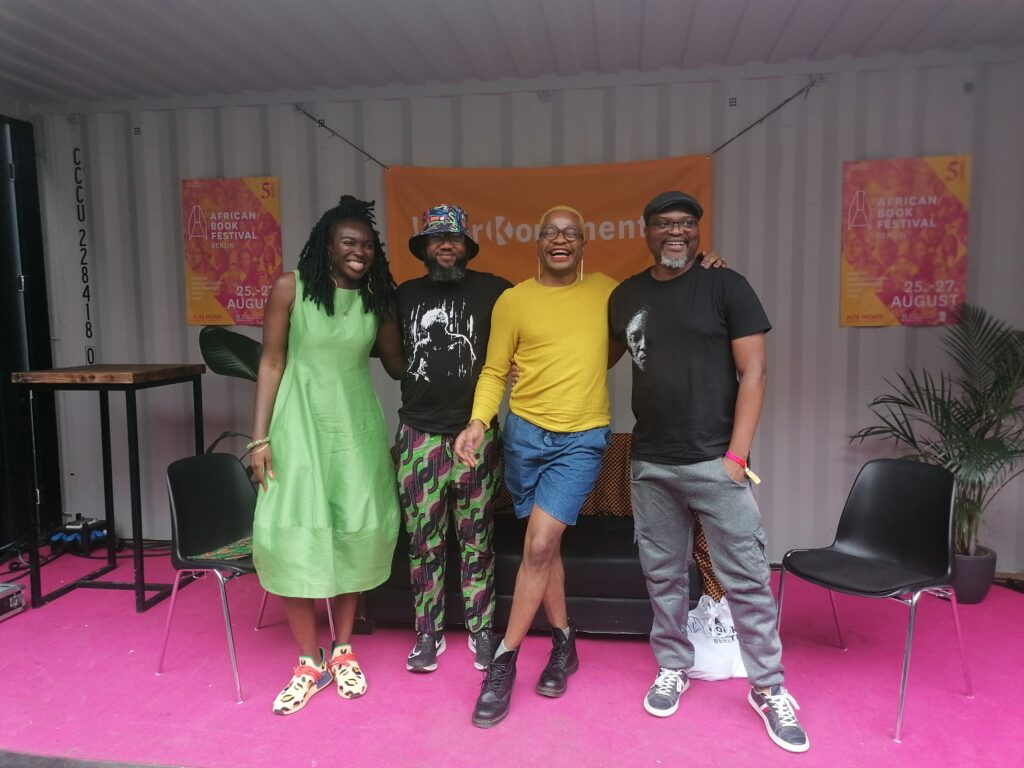
Der aus Simbabwe stammende Autor Tendai Huchu hatte mit Der Friseur von Harare einen literarischen Erfolg. In Berlin ist der mittlerweile seit vielen Jahren in Schottland lebende Autor wegen seiner Edinburgh Night Series, einer phantastischen Trilogie, die auch auf Deutsch erschienen ist. Wie sagt die MacMillan Library: Sixth Sense meets Stranger Things. T.L. Huchu macht einem augenscheinlich klar, dass von afrikanischen Autor:innen alle Genres bedient werden. Dies zeigt das grosse Interesse an fantastischer Literatur auf dem afrikanischen Kontinent. Und wer hat gesagt, dass Literatur wie Stanislaw Lem und H.P. Lovecraft ein weisses Genre ist?
Eine fantastische Reise hat auch die aus Mombasa angereiste Autorin Khadija Abdalla Bajaber unternommen. In ihrem viel gepriesenen Roman House of Stone verarbeitet sie viele der an der Swahili Coast virulenten Themen und Mythen auf ihre eigene Art. Der arabische Einfluss, der an der ostafrikanischen Küste mit der Schwarzafrikanischen Kultur verschmilzt, lässt muslimische Tradition, arabische Mythologie und kenianische Gegenwart erleben. Auf einer abenteuerlichen Suche nach dem Vater, wagt sich die Hauptfigur Aisha mit einem Schiff aufs Meer. Dass hier auch Tiere sprechen und die absonderlichsten Dinge passieren machen diese Reise und das Buch nur umso interessanter. Über die Entstehung des Buches und den Einfluss der Swahili-Kultur gibt es ein ausführliches Interview:https://www.cultureafrica.net/the-house-of-rust-and-swahili-culture-interview-with-mombasa-writer-khadija-abdalla-bajaber-engl/
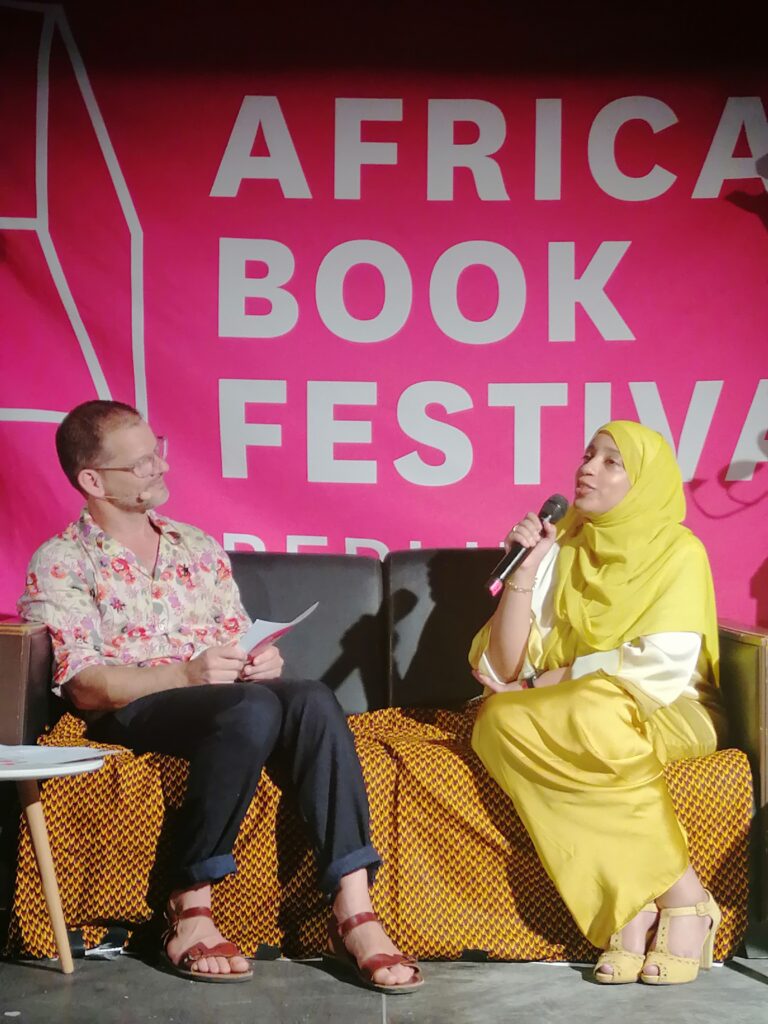
Im Jahr 2020 hat die aus Ruanda stammende Autorin Tete Loeper ihr Buch “Barefoot in Germany” herausgebracht. Es ist eine weibliche Migationsgeschichte nach Deutschland. Dem viel gepriesenen Westen wird ein sehr analytischer Spiegel vorgehalten. Es schmerzt mitunter lesen zu müssen, wie sich eine satte weisse Gesellschaft eingerichtet hat und nur ungern gestört werden moechte. Durch viel Eigenpromotion auf Lesungen und Panels schaffte es das Buch auch in eine Deutsche Übersetzung. Der Berliner Orlanda Verlag hat Tetes Buch nach einer Überarbeitung 2022 auf Deutsch veroffentlicht.
Ein Interview mit Tete Loeper gibt es hier:https://www.cultureafrica.net/barefoot-in-germany-interview-with-mit-rwandan-german-author-tete-loeper-engl-ger/
Auch mit dem Orlanda Verlag gibt es ein Interview zum Thema: https://www.cultureafrica.net/tsitsi-dangarembga-and-much-more-orlanda-verlag-publishing-house-berlin-interview-ger-engl/
Gern gesehener Gast auf dem ABF war auch dieses Jahr wieder der aus dem DR Kongo stammende Autor Fiston Mwanza Mujila. Spätestens seit seinem Rom Tram 83 ist er vielen Lesere:innen ein Begriff. Seine Buecher haben mehrere Preise gewonnen und sind in viele Sprachen uebersetzt. Der in Graz lebende Autor hat in Berlin seine Essaysammlung Schluesselorte vorgestellt, in der sich auch einige auf dem Festival anwesende Autoren finden.

Der Ort
Nachdem letztes Jahr wegen der Absage des Veranstalters schnell eine Alternative für das Festival gefunden werden musste, war auch 2023 die Alte Münze in Berlin Mitte der Veranstaltungsort. Der informelle Charme der Veranstaltungsraume macht das preussisch industriellen Grau des grossen Geländes wieder wett. Im Innenhof fand wieder eine African Market mit Kulinarik und allerlei Produkten vom Kontinent statt, auch die Open Air Stage als dritter Auftrittsort war hier. Traditionell gibt es das komplette Bücherangebot der Autor:innen des Festivals und darüber hinaus zu finden. Das Angebot klingt banal, ist aber eine gut angenommene Offerte für Bücherfans, die sonst nicht so einfach an afrikanische Literatur kommen koennen. Und das nicht nur in deutschen Ausgaben sondern auch im Original.

Das Festival
Statt offiziöser Auftaktveranstaltung mit längereren, teils langatmigen Lesungen, Diskussionen wie im letzten Jahr, setzte das Veranstaltungsteam dieses Jahr auf Unterhalung und Geschwindigkeit: Love at First Read. Eine Art moderiertes speed dating mit allen teilnehmenden Autor:innen warf fünfminütige Schlaglichter auf das Programm der kommenden Tage. Das war sehr unterhaltsam und gut moderiert. Man setzte wieder auf das Berliner Moderator:innen Duo Jörg Petzold und Alexandra Antwi-Boasiako, die abwechselnd die Gäste und ihre Bücher vorstellten. Oft musste der Gong nach fünf Minuten unterbrechen: es ist nicht so einfach komplexe Inhalte in kurzer Zeit unter zu bringen! Aber es klappte. Das Publikum dankte es. Ständig ging es hin und her. Im vollbesetzten Saal/Main Stage spielte aber erstmal das String Archestra Klassik und begeisterte das Publikum.
Auf drei Bühnen waren dann die folgenden Tage alle geladenen Autor:innen gefordert. In moderierten Book Specials kamen die aktuellen Bücher der Autor:innen zum Leuchten. Panel Diskussionen gab es zu den Themen “Woman Writing against Predjudice” mit Leila Abouela, Bisi Adjapon, Khadija Abdalla Bajaber und Moderatorin Celia Parbey, “Freedom to Write, writing to be free” mit Tendai Huchu, Haji Jabir, Laila Lalami, moderiert von Edwige-Renee Dro, “Schweigen wie das Meer” mit C.A. Davids, Fred Khumalo, Abdelaziz Baraka Sakin, moderiert von Stefanie Hirsbrunner und “Cancel Culture and Media” mit Chiponda Chimbelu, Jeannine Kantara, Gökce Yurdakul und Moderatorin Fabienne Mahwane Gretschel. Diese Veranstaltungen waren alle sehr gut besucht. Letztere war durch die vielen Fragen des Publikums kaum zu stoppen. Ein gutes Zeichen!
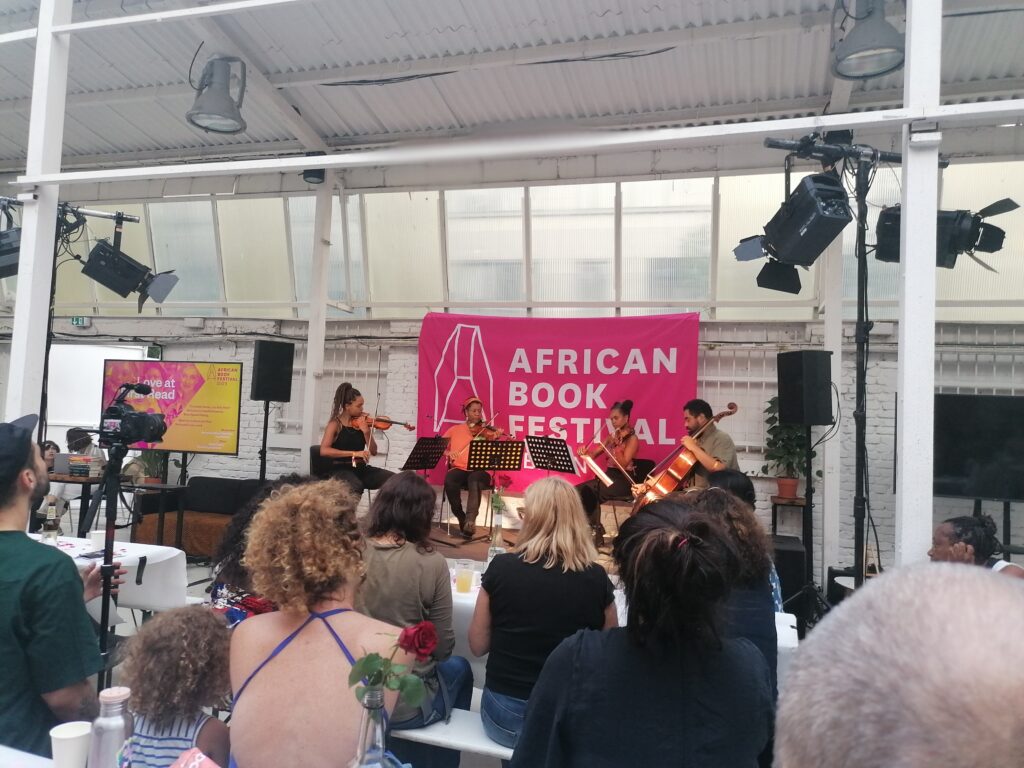
Es gab auch diesmal wieder das beim Publikum beliebte Literatur Quartett. Dem Fernseh-Klassiker folgend, warben vier Autor:innen um ihre mitgebrachten Bücher: Bisi Adjapon, Edwige-Renee Dro, Fred Khumalo und Stefanie Hirsbrunner lieferten sich einen unterhaltsamen Kampf um die Gunst des Publikums und der favorisierten Literatur. Es gab heftige twists, keine:r konnte sich sicher sein, “sein” Buch als Favorit nach Hause zu bringen. Es zeigte sich, dass Bisi Adjapon durchaus das Zeug hat, in die Fusstapfen eines Marcel Reich-Ranicki zu treten!
“Your next good read” war ebenfalls am Start. In unterschiedlicher Besetzung konnte man den Lesegewohnheiten und Tipps der Autor:innen nachspüren. Und wenn Fiston Mwanza Mujila dabei ist, weiss man, dass dieser Performance starke Autor seine Stimme zur Rezitation einsetzen wird. Und was für eine! Und man konnte seine Augen rollen sehen, als Tete Loeper ihr eigenes Buch anpries. Es ist ihr zu Gute zu halten, dass sie dann auch noch eine andere Autorin, ebenfalls aus Ruanda, vorstellte. Auch Max Lobe und Niq Mhlongo sind erprobt im rhetorischen Feuerwerk, dass hier auf dem ABF gerne abgefeuert wird.
Neben dem Eröffnungskonzert wurde das ABF zur Mittagszeit mit Disnay Lopez musikalisch bespielt. Auch sie war schon letztes Jahr zu Gast und ist immer ein Stimmungsgarant. Am Samstag Abend traten dann die in Berlin lebenden Südafrikaner:in Adelle Nqeto und Tsepo Kolitsoe Pooe auf und brachten das Publikum mit ihrer faszinierenden Klangwelt zum Staunen.
Musik, gutes Essen und Literatur. Sekt und Häppchen habe ich nicht gesehen. Dafür viel Herzlichkeit und unvergessliche Eindruecke. Wer auf der Suche nach einer aussergewöhnlichen Normalität im Literaturbetrieb ist, der ist hier in der Mitte Berlins bestens aufgehoben. Nicht entweder oder ist das Thema. Ja, es ist notwendig, dass sich auch die etablierten Verlage um afrikanische Autor:innen mehr bemühen, mehr übersetzen. Deutsche Literaturfestivals und die deutschen Leitmessen Frankfurt und Leipzig (wo bleibt eigentlich das Gastland Nigeria, Suedafrika, Ghana, Kenia??) sollen gerne verstärkt afrikanische Literatur zum Thema machen. Das African Book Festival ist dabei eine sichere Bank und bleibt unverzichtbar für die afrikanische Literatur. Nächstes Jahr, Ende August werden hoffentlich wieder die Tore aufgehen.
Hans Hofele

ENGLISH
The fifth edition of the African Book Festival in Berlin has come to an end, and soon after it’s over, you’re missing something. Why is that and what makes this literary event so special? These are the questions I would like to explore in my personal report of this year’s ABF.
I can still remember last year, a conversation with Jona Krützfeld from akono Verlag, who is herself a publisher of African literature. We discussed the need for such a festival in Germany. So why is there a need for this festival, which is now in its fifth edition? The answers varied. I have also asked this question to others in the cultural sector over the course of the last year. But this is always a theoretical discussion. The best answer is given by the African Book Festival itself. Because if the ABF has a special class, it’s that everything here is anything but theoretical and academic. Literature you can touch, so to speak. From the sometimes too high horse of academic lecturing at the elitist literature festivals, to an entertaining event for literature lovers. Once again, the large number of visitors to the ABF, most of them young people, gives one hope that African literature can be very much alive. Whoever gets involved in this festival for three days can get very close to African literature. All authors are present for the whole three days, they are not flown in for a short time but spend the days at the festival. And if you want, you can get very close to them. You can sit down with them and talk.
The organizers, Stefanie Hirsbrunner, Karla Kutzner and Venice Trommer, do this very cleverly: Thus, the invited authors are not only found in book presentations but often also in panels or other formats. And that is a good thing. Because of the sometimes long journeys, this also makes economic sense. But not only that, you automatically experience the authors in different roles during the festival. The star cult around certain names is out of place here. There is an almost egalitarian atmosphere.
The authors and their books
After the irritating storm of indignation over the appointment of the Mauritanian writer Mohamedou Ould Slahi as a curator at the beginning of the year, (see also the interview on this https://www.cultureafrica.net/african-book-festival-berlin-2023-boost-for-african-literature-in-germany-interview-mit-with-co-organizer-venice-trommer/
and Mohamedou’s subsequent demission, one was curious to see what to expect at the ABF this year. And yes, a breath of Mohamedou blew over the festival. The organizers had obviously been inspired. North African authors left their mark on the festival.
Leila Lalami (Morocco/USA) was their secret star. The award-winning author brought her books The Others and The Forbidden Report. Lalami has repeatedly described migrants’ fates, the way people with different religions and cultural backgrounds deal with each other in her new home, the USA. She does this in a clever, exciting way, without raising a moral finger.

Leila Abouela, the Sudanese-born author, lives in London. In her books, the lines of conflict, religion and Islamic tradition in Western modernity are also very clear. The constant theme of “home”, which she addresses in her book Anderswo, Daheim (Elsewhere, At Home), also shows the turmoil.
The author Abdelaziz Baraka Sakin, who now lives in Austria, also comes from Sudan. In his novel The Messiah of Dafur, which has also been published in German, Baraka Sakin lets a character who sees himself as a revenant of Jesus experience the conditions in Dafur, which has been affected by the Buergre War and genocide. It is not realism that Baraka Sakin chooses for his novel. He lets the reader take part in the fate of a country in an imaginative way. Death is always present in this region, which is also his own, but of which we in Germany know little.
The author C. A. Davids, who came from Cape Town, brought her book “How to be a Revolutionary” with her. In it, they process their own experiences with China. There, in Shanghai, two residents of an apartment building get to know each other. Both are connected by a secret. Beth, a diplomat from Johannesburg, is newly divorced and a bit veoren in the huge metropolis. Her new boyfriend, Zhao, does forbidden things in his apartment. Is it a typewriter that she listens to at night?
The author Haji Jabir, who comes from Eritrea, is searching for identity and a concept of home. In Black Foam, he describes his protagonist Davoud’s journey through Africa’s north, to Israel and to himself. Even several changes of identity do not help him overcome a wall of rejection and prejudice.

The Zimbabwean-born author Tendai Huchu had a literary success with The Barber of Harare. The author, who has now been living in Scotland for many years, is in Berlin because of his Edinburgh Night Series, a fantastic trilogy that has also been published in German. As the macMillan Library says: Sixth Sense meets Stranger Things. T.L. Huchu makes it clear that all genres are served by African authors. This shows the great interest in fantastic literature on the African continent. And who said that literature like Stanislaw Lem and H.P. Lovecraft is a white genre?

Author Khadija Abdalla Bajaber, who has traveled from Mombasa, has also embarked on a fantastic journey. In her much-praised novel House of Stone, she incorporates many of the themes and myths virulent on the Swahili Coast in her own way. The Arab influence that merges with Black African culture on the East African coast brings to life Muslim tradition, Arab mythology, and Kenyan presence. On an adventurous search for her father, the main character Aisha ventures out to sea in a ship. The fact that animals also speak here and the strangest things happen make this journey and the book all the more interesting. There is a detailed interview about the creation of the book and the influence of Swahili culture:https://www.cultureafrica.net/the-house-of-rust-and-swahili-culture-interview-with-mombasa-writer-khadija-abdalla-bajaber-engl/
Newly published in German is the book Dancing the Death Drill, by South African author Fred Khumalo. He has written an exciting story from South Africa’s colonial era. At the same time, he has shed light on historical events that are often glossed over in the Western narrative of history. African soldiers died by the thousands for their colonial powers in the First and Second World Wars.
He takes the sinking of the troop carrier SS Mendi, loaded with black recruits from South Africa, as an opportunity to tell an exciting story about morality and conscience in times of war.
Max Lobe (Cameroon/Switzerland)has also repeatedly dealt with the history of his home country Cameroon. Several colonial rulers ruled the country for almost a hundred years, plunging the country into a maelstrom of violence, cultural extinction and poverty.Confidentialities, is the literary processing of a quest. With the help of his family, who still live in the Cameroonian city of Duala, Max Lobe was able to meet a woman who lived through the bloody struggle for independence: Mâ Maliga.
In 2020, Tete Loeper, an author from Rwanda, published her book Barefoot in Germany. It is a female migration story to Germany. A very analytical mirror is held up to the much-vaunted West. It is sometimes painful to read how a rich white society has established itself and is reluctant to be disturbed. Through much self-promotion at readings and panels, the book also made it into a German translation. The Orlanda publishing house in Berlin published Tete’s book in 2022. An interview with Tete Loeper can be found here:https://www.cultureafrica.net/barefoot-in-germany-interview-with-mit-rwandan-german-author-tete-loeper-engl-ger/
There is also an interview with Orlanda Verlag: https://www.cultureafrica.net/tsitsi-dangarembga-and-much-more-orlanda-verlag-publishing-house-berlin-interview-ger-engl/
A welcome guest at the ABF this year was again the author Fiston Mwanza Mujila, who comes from the DR Congo. Since his novel Tram 83, at the latest, he is known to many readers. His books have won several prizes and have been translated into many languages. The author, who lives in Graz, presented his essay collection Schluesselorte (Key Places) in Berlin, which also includes some of the authors present at the festival.
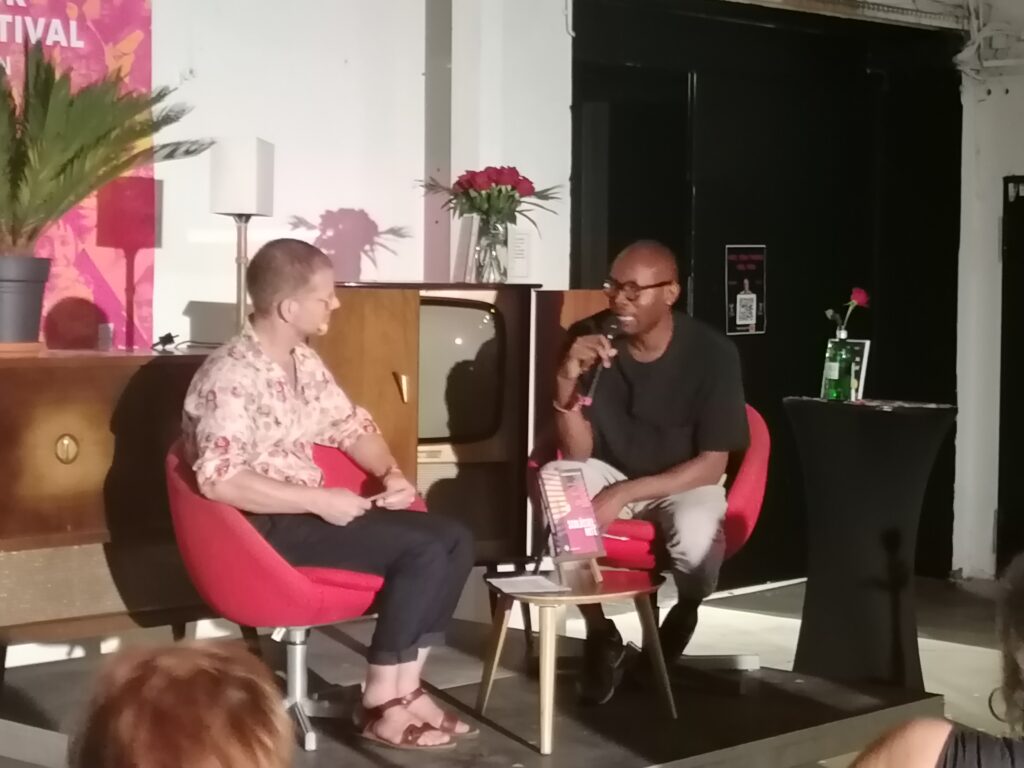
The Venue
After an alternative for the festival had to be found quickly last year due to the cancellation of the organizer, the Alte Münze in Berlin Mitte was the venue again in 2023. The informal charm of the event rooms made up for the Prussian industrial gray of the large grounds. In the inner courtyard there was again an African Market with culinary delights and all kinds of products from the continent, and the Open Air Stage was also here as a third performance venue. Traditionally, the complete range of books by the authors of the festival and beyond could be found. The offer sounds banal, but it is a well-received offer for book fans who otherwise cannot easily get hold of African literature. And not only in German editions but also in the original.
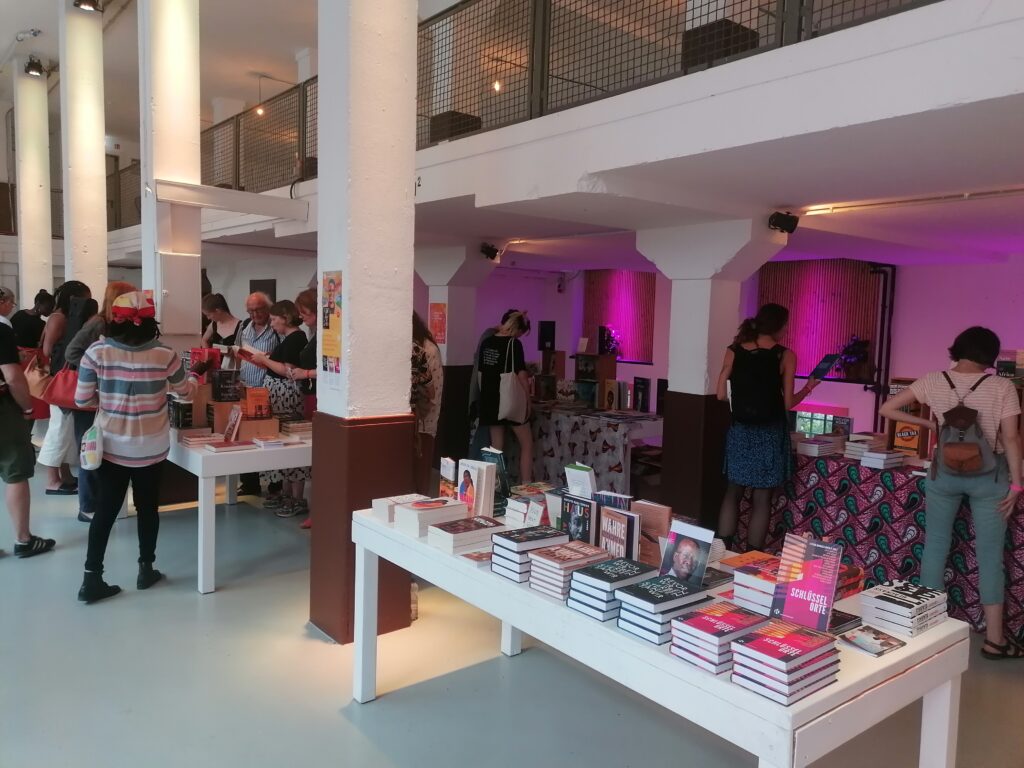
The Festival
Instead of an official kick-off event with lengthy readings and discussions as last year, this year the event team focused on entertainment and speed: Love at First Read. A kind of moderated speed dating with all participating authors threw five-minute spotlights on the program of the coming days. It was very entertaining and well moderated. Once again, the Berlin duo of Jörg Petzold and Alexandra Antwi-Boasiako took turns introducing the guests and their books.
Often the gong had to interrupt after five minutes, it is not so easy to bring complex content under in a short time! But it worked. The audience thanked him. Constantly it went back and forth. But first the String Archestra played classical music in the full hall/Main Stage and inspired the audience.
On the following days, all invited authors were challenged on three stages. In moderated book specials the current books of the authors were presented. Panel discussions were held on the topics “Woman Writing against Predjudice” with Leila Abouela, Bisi Adjapon, Khadija Abdalla Bajaber and moderator Celia Parbey, “Freedom to Write, writing to be free” with Tendai Huchu, Haji Jabir, Laila Lalami, moderated by Edwige-Renee Dro, “Silence like the sea” with C. A. Davids, Fred Khumalo, Abdelaziz Baraka Sakin, moderated by Stefanie Hirsbrunner and “Cancel Culture and Media” with Chiponda Chimbelu, Jeannine Kantara, Gökce Yurdakul and moderator Fabienne Mahwane Gretschel. These events were all very well attended. The latter was hardly stopped by the many questions from the audience. A good sign!

Once again, there was the literature quartet, popular with the audience. Following the television classic, four authors competed for the books they had brought with them: Bisi Adjapon, Edwige-Renee Dro, Fred Khumalo and Stefanie Hirsbrunner engaged in an entertaining battle for the favor of the audience and the favored literature. There were fierce twists, no:r could be sure to bring “his” book home as favorite. It turned out that Bisi Adjapon definitely has what it takes to follow in the footsteps of Marcel Reich-Ranicki!
“Your next good read” was also at the start. In different lineups, the reading habits and tips of the authors could be traced. And when Fiston Mwanza Mujila is present, you know that this performance strong author will use his voice for recitation. And what a voice it was! And you could see the eyes rolling as Tete Loeper touted her own book. To her credit, she then went on to introduce another author, also from Rwanda. Max Lobe and Niq Mhlongo are also well versed in the rhetorical fireworks that are readily fired off here at the ABF.
In addition to the opening concert, the ABF was musically played at lunchtime with Disnay Lopez. She was also a guest last year and is always a guarantee of atmosphere. Then on Saturday evening, Berlin-based South Africans:in Adelle Nqeto and Tsepo Kolitsoe Pooe performed and amazed the audience with their fascinating soundscape.
Music, good food and literature. I did not see champagne and canapés. But a lot of cordiality and unforgettable impressions. If you are looking for an unusual normality in the literature business, you are in good hands here in the center of Berlin. Not either or is the theme. Yes, it is necessary that also the established publishing houses make more efforts for African authors, translate more. German literature festivals and the leading German trade fairs in Frankfurt and Leipzig (where is the Gastland Nigeria, South Africa, Ghana, Kenya??) should be more interested in African literature. The African Book Festival is a safe bank and remains indispensable for African literature. Next year, at the end of August, hopefully the gates will open again.
Hans Hofele
copyright:cultureafrica.net 2023


